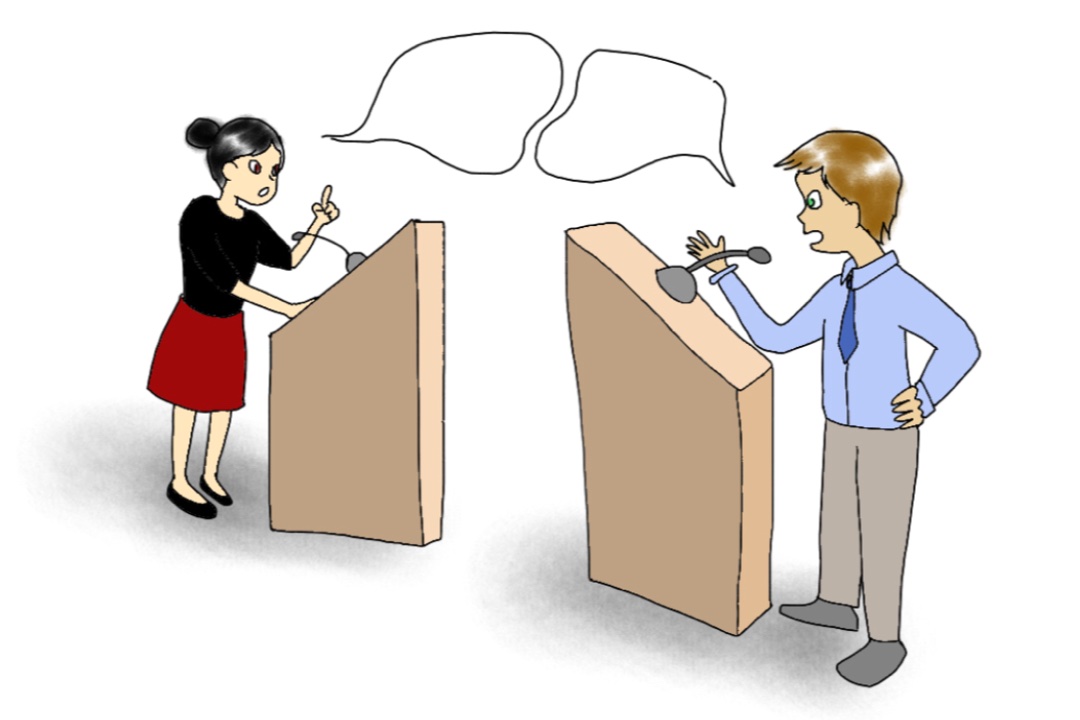Whether it’s because you’re flubbing your lines, searching for the right word, or struggling to articulate arguments — being good at communicating your beliefs is hard. Arguing is difficult, and so is listening to the opposite side of an argument while you ground yourself in your stance.
But what if you want to get better at these skills?
Debating is an ability that enables individuals to not only speak efficiently, but to also construct and defend arguments. It exposes participants to social, economic, artistic, and scientific issues of their time while encouraging them to analyze the world they live in. Finally, it teaches people to listen to what others have to say and how to respond in a structured, comprehensive manner.
At the Hart House Debate Club (HHDC), these skills can be incorporated and honed with enough practice, dedication, and motivation.
The HHDC is one of U of T’s most prominent public speaking clubs and one of the most successful debating clubs in North America. Home to about 50 members, the club offers a space for students of all skill levels to try their hand at artful persuasion. Whether you’re a novice or a competitive debater with high school experience, the club has a ton of resources and opportunities to further your personal goals for growth in public speaking.
Hosting two meetings a week, any U of T student is welcome to attend drop-in practice debate rounds. During practices, students are given a debate topic, 15 minutes to prepare an argument, and seven minutes to speak and defend their given position. The club also runs seminars targeted at personal development on both introductory and competitive levels. For those who wish to debate competitively, the HHDC also sends members every weekend to compete at both local and international tournaments.
This year alone, at the World Universities Debating Championship (WUDC), HHDC members made it to the grand finals and two members of the club were named part of the top 20 speakers in the world. Members have made it to finals at the Yale Inter-Varsity and the Oxford Inter-Varsity. They also won the North American Debating Championships, making them fairly well-known throughout Canada and across the international debate scene. The prestige of the HHDC has challenged and motivated many members to go past their limits to prepare for and debate in global circuits.
Serena Yuan is a member of the HHDC and a second-year student studying environmental studies and public policy. For her, debate is a learning opportunity, where she can challenge herself to explore her own potential.
“I learned from a lot of really fantastic debaters whose brains I could really, really pick,” said Yuan. Yuan elaborated that debate is largely about “getting familiar with what your strengths and weaknesses are and having a lot of opportunities to go to different tournaments, partner with people, and interact with different motions and different topics.”
However, Yuan doesn’t shy away from the intensity of competitive debate. She described the process of practicing for the WUDC as being “super intensive.”
“It was a huge drain, a huge commitment,” Yuan admitted. “But it was pretty rewarding. And if you’ve been in debate for quite a while, I think it’s an enjoyable experience.”
As the HHDC’s current equity officer, Yuan is one of several debaters heavily involved in the competitive aspects of debate. However, the majority of the club’s members are typically less involved in these intensive tournaments and often have little to no experience in debate before getting involved in university.
Jessica Singh, a novice debater at the HHDC, described her experience as someone who did debate in high school but was still able to learn from the club’s opportunities.
“It can obviously be a little bit nerve wracking for newer individuals, especially if you don’t have high school experience,” she explained. “Debate is all about critical thinking… It pushes you out of your comfort zone, whether that pushes you with more confidence or with more speaking. Whatever you’re looking for, if you stick with it, I really think it gets better.”
Learning to debate is not an easy task, and to be good takes a good amount of effort. However, the HHDC regularly provides beginners like Singh with constructive feedback. The club also provides resources specifically geared toward novice debaters, including mentorship programs and seminar presentations. Once debaters get past these early stages, Singh explains, the skills they gain are limitless.
“[Debate] is a skill that transcends any field,” Singh said. “You’re going to communicate, and effective communication is so important, and debate helps you do that.” Singh also added that debate encourages participants to think critically in any scenario. “It’s so fascinating to think about problems and learn about all these different perspectives that you, in your daily life, probably don’t engage with.”
Unlike many other sports or activities, debate challenges participants to think, listen, and speak — with reason — about serious topics relevant to different aspects of life. By introducing themselves to debate, individuals get the opportunity to achieve their personal and academic goals, while making friends with similar passions.
It’s not necessarily easy, but if you’re tired of rambling through messy presentation after messy presentation, know that the HHDC hosts meetings every Tuesday and Thursday and welcomes all students with open arms and open mics.


